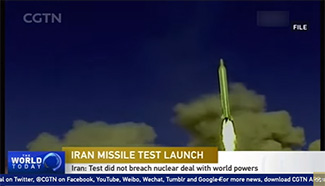HAVANA, Feb. 3 (Xinhua) -- The U.S. financial blockade on Cuba has been a "fiasco" which continues to damage the island's economy and its social development after 55 years, said an editorial published in state media on Friday.
"The blockade is an obsolete policy and widely rejected by the international community. It has been a resounding fiasco after several U.S. administrations in their essential purpose of destroying the Cuban Revolution," said the editorial published on the website of the Cuban Foreign Ministry.
This is the first official mention of the blockade by Havana since the inauguration of U.S. President Donald Trump on Jan. 20.
"This measure continues to harm the Cuban people and hamper the economic and social development of Cuba," it stated.
On February 3, 1962, former U.S. President John F. Kennedy, signed an executive order which put in place a trade and economic embargo on Cuba.
Over the years since, several laws were approved by the U.S. Congress to reinforce the blockade even affecting the island's commercial and financial ties with third nations.
The Cuban government has repeatedly stated the embargo is the main obstacle in its process of normalizing relations with Washington, after both countries decided to reestablish ties in 2015.
"Although new regulations have been issued in the last two years that have partially modified the blockade, the obstacles, restrictions and limitations to the Cuban economy are still in place," the editorial said.
The editorial also highlighted the "extraterritorial effects" of this policy which not only affects the island's trade with other nations but also slaps large fines on any business entities that establish economic ties with Cuba.
According to official Cuban figures, since December 2014, the U.S. Treasury Department has imposed fines worth over 2.8 billion dollars on banks and companies that have commercial links with Havana.
The editorial also highlights that no other topic in the world so unites the international community, as demonstrated year by year in overwhelming votes at the United Nations General Assembly. Only the U.S. and Israel have usually voted No to a resolution condemning the blockade, although the U.S. abstained for the first time in 2016.
"For over 25 years the international community has rejected this policy. In 2016, the U.S. even abstained and 191 countries voted against it," added the statement.
The article mentioned that former U.S. President Barack Obama saw the blockade as a "failure" in a Policy Directive signed in October.
"Although the total lifting of the blockade is an exclusive prerogative of the U.S. Congress, that nation's president has broad executive powers to continue modifying its application," said the editorial.
Havana estimates economic losses incurred during the last 55 years at over 125 billion U.S. dollars.














